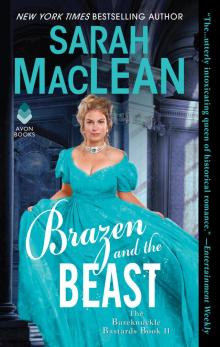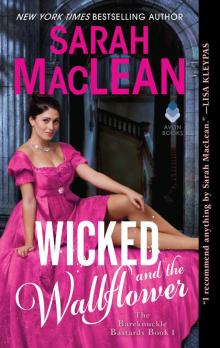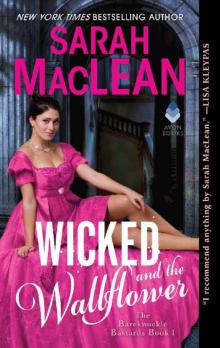- Home
- Sarah MacLean
Brazen and the Beast Page 2
Brazen and the Beast Read online
Page 2
“We run in them tonight.”
Her grin became a slow, easy smile, and Whit couldn’t help but linger on it. The carriage began to slow, and she peeked out the curtain. “We’re nearly there,” she said quietly. “It’s time for you to go, sir. I’m sure you’ll agree that neither of us will have any interest in you being discovered.”
“My hands,” he said, even as the ropes slackened further.
She shook her head. “I can’t risk you taking revenge.”
He met her gaze without hesitation. “My revenge is not a risk. It’s a certainty.”
“I’ve no doubt of that. But I can’t risk you taking it through me. Not tonight.” She reached past him for the door handle, speaking at his ear, above the rattle of wheels and horses from the street beyond. “As I’ve said . . .”
“You have plans,” he finished for her, turning toward her, unable to resist her scent, like an almond teacake, sweet temptation.
She met his eyes. “Yes.”
“Tell me the plan, and I’ll let you go.” He’d find her.
That smile again. “You’re very arrogant, sir. Must I remind you that I’m the one letting you go?”
“Tell me.” The command was rough.
He saw the change in her. Watched hesitation turn to curiosity. To bravery. And then, like a gift, she whispered, “Perhaps I should show you, instead.”
Christ, yes.
She kissed him, pressing her lips to his, soft and sweet and inexperienced and tasting like wine, tempting as hell. He worked double time to free his hands. To show this strange, curious woman just how willing he was to see her plans through.
She freed him first. There was a tug at his wrists, and the ropes loosened a heartbeat before she lifted her lips from his. He opened his eyes, saw the gleam of a small pocketknife in her hand. She’d changed her mind. Cut him loose.
To capture her. To resume the kiss.
As she’d warned, however, the lady had other plans.
Before he could touch her, the carriage slowed to take a corner, and she opened the door at his back. “Good-bye.”
Instinct had Whit turning as he fell, tucking his chin, protecting his head, and propelling himself into a roll, even as a single thought thundered through him.
She’s getting away.
He came to a stop against the wall of a nearby tavern, scattering the collection of men outside.
“Oy!” one called out, coming for him. “All right, bruv?”
Whit came to his feet, shaking out his arms, rolling his shoulders back, shifting his weight back and forth to test muscle and bone—ensuring all was in working order before extracting two watches from his pocket and checking their clockwork. Half-nine.
“Cor! I ain’t never seen anyone right ’imself from such a thing so fast,” the man said, reaching out to clap Whit on the shoulder. The hand stilled before it settled, however, as eyes set on Whit’s face, immediately widening in recognition. Warmth turned to fear as the man took a step back. “Beast.”
Whit lifted his chin in acknowledgment of the name, even as awareness threaded through him. If this man knew him—knew his name—
He turned, his gaze narrowing on the curve in the dark cobblestone street where the carriage had disappeared, along with its passenger, deep into the maze of tangled streets that marked Covent Garden.
Satisfaction thrummed through him.
She wasn’t getting away after all.
Chapter Three
“You pushed him out?” Nora’s shock was clear as she peeked inside the empty carriage after Hattie had descended. “I thought we didn’t wish for his death?”
Hattie ran her fingers over the silk of the mask she’d donned before exiting the carriage. “He’s not dead.”
She’d hung out the door of the carriage long enough to make sure of it—long enough to marvel at the way he’d launched himself into a roll before springing to his feet, as though he were frequently dispatched from carriages.
She supposed that, since she’d discovered him bound in her carriage that very evening, he might well be tossed from conveyances regularly. She’d watched him nonetheless, holding her breath until he’d come to his feet, unharmed.
“He woke, then?” Nora asked.
Hattie nodded, her fingers coming to her lips, the feel of his firm, smooth kiss a lingering echo there, along with the taste of something . . . lemon?
“And?”
She looked to her friend. “And what?”
Nora rolled her eyes. “Who is he?”
“He didn’t say.”
A pause. “No, I don’t suppose he would.”
No. Not that I wouldn’t give a great deal to know.
“You should ask Augie.” Hattie’s gaze shot to her friend. Had she spoken aloud? Nora grinned. “Do you forget that I know your mind as well as my own?”
Nora and Hattie had been friends for a lifetime—more than one, Nora’s mother used to say, watching the two of them play beneath the table in her back garden, telling secrets. Elisabeth Madewell, Duchess of Holymoor, and Hattie’s mother had existed together on the outskirts of the aristocracy. Neither had received a warm welcome, fate having intervened to make an Irish actress and a shop girl from Bristol into a duchess and countess, respectively. They’d been destined to be friends long before Hattie’s father had received his life peerage, two inseparable souls who did everything together, including birth daughters—Nora and Hattie, born within weeks of each other, raised as close as sisters, never given a chance not to love one another as such.
“I’ll say two things,” Nora added.
“Only two?”
“All right. Two for now. I shall reserve the right to say more,” Nora amended. “First, you’d better hope you are right and we didn’t accidentally murder the man.”
“We didn’t,” Hattie said.
“And second . . .” Nora continued without pause. “The next time I suggest we leave the unconscious man in the carriage and take my curricle, we take the damn curricle.”
“If we’d taken the curricle, we might have died,” Hattie scoffed. “You drive that thing far too quickly.”
“I’m in complete control the whole time.”
When their mothers had died within months of each other—sisters even in that—Nora had come searching for comfort she could not find with her father and older brother, men too aristocratic to allow themselves the luxury of grief. But the Sedleys, born common and now the kind of aristocrats who weren’t considered at all aristocratic, had no such trouble. They’d made space for Nora in their home and at their table, and it wasn’t long before she was spending more nights at Sedley House than at her own, something her father and brother seemed not to notice—just as they’d seemed not to notice when she’d begun spending her pin money on carriages and curricles to rival those driven by society’s most ostentatious dandies.
A woman in charge of her own conveyance was a woman in charge of her own destiny, Nora liked to say.
Hattie wasn’t entirely certain of that, but she did not deny that it paid to have a friend with a particular skill at driving, especially on nights when one did not wish coachmen to talk—which any coachman would do if he’d deposited two unmarried aristocratic daughters outside 72 Shelton Street. It was no matter that 72 Shelton Street did not, at first glance, appear to be a bordello.
Was it still called a bordello if it was for women?
Hattie supposed that did not matter, either, but the beautifully appointed building looked nothing like what she imagined its male-serving counterparts looked like. Indeed, it looked warm and welcoming, shining like a beacon, windows full of golden light, planters exploding with autumnal colors hanging on either side of the door and above, in boxes at every sill.
It did not escape Hattie’s notice that the windows were covered, however, which did seem reasonable, as the goings-on within were surely of a private nature.
She lifted a hand and checked the seat of her mask once more. “I
f we’d taken the curricle, we would have been seen.”
“I suppose you’re right.” Nora shrugged one shoulder and flashed Hattie a grin. “Well then, out of the carriage with him.”
Hattie chuckled. “I shouldn’t have done it.”
“We aren’t going back to apologize,” Nora said, waving a hand at the door. “And so? Are you going in?”
Hattie took a deep breath. This was it. She turned to her friend. “Is this mad?”
“Absolutely,” Nora replied.
“Nora!”
“It’s mad in the best possible way. You have plans, Hattie. And this is how you get to them. Once this is done, there’s no going back. And frankly, you deserve it.”
Doubt whispered, barely there and heard nonetheless. “You have plans, too, but you haven’t done anything like this.”
A pause, and Nora shrugged. “I haven’t had to.” The universe had gifted Nora with wealth and privilege, and a family that didn’t seem to mind if she used both to take life by the horns.
Hattie had not been so lucky. She wasn’t the kind of woman who was expected to take life by the horns. But after tonight, she intended to show the world just how well she intended to do just that.
But first, she was required to do away with the one thing that held her back.
And so, she was here.
She turned to Nora. “You’re certain this is—”
An approaching carriage interrupted, the clattering horses and rattling wheels thundering in her ears as it pulled to a stop. A trio of laughing women descended in beautiful silk gowns that gleamed like jewels and harlequin masks nearly identical to Hattie’s. Long-necked and narrow-waisted, with wide smiles, it was easy to tell these women were beautiful.
Hattie was not beautiful.
She took a step back, pressing up against the side of the carriage.
“Well, now I’m certain this is the place,” Nora said dryly.
Hattie looked to her friend. “But why would they—”
“Why would you?”
“But they could have—” Anyone they liked.
Nora slid her a look, a dark brow arching. “You could, too.”
It wasn’t true, of course. Men did not clamor after Hattie. Oh, they liked her fine. After all, she liked ships and horses and had a head for business, and she was clever enough to amuse during a dinner or a ball. But when a woman looked as she did and talked as she did, men were far more likely to clap her on the shoulder than they were to clutch her to them in passionate embrace. Good old Hattie, even when she’d been in her first season out and not old at all.
She didn’t say all that, though, and Nora filled the silence. “Perhaps they, too, are looking for something . . . untethered.” They watched the women rap on the door of 72 Shelton Street, a small window opening and closing before the door itself followed suit, and they had disappeared within, leaving the street silent once more. “Perhaps they, too, are looking to captain their own fates.”
A nightingale cooed above them, answered almost immediately by another, at a distance.
The Year of Hattie.
She nodded. “All right, then.”
Her friend grinned. “All right, then.”
“You are certain you don’t wish to come in?”
“And do what?” Nora asked with a laugh. “There is nothing within for me. I thought I’d take a drive—see if I can beat my time round Hyde Park.”
“Two hours?”
“I shall be here.” Nora tipped her coachman’s cap and flashed Hattie a grin. “Enjoy yourself, milady.”
That had been Hattie’s plan all along, hadn’t it? To enjoy herself on this, the first night of the rest of her life, when she closed the door on the past and took her future well in hand. With a nod to her friend, she approached the building, her eyes fixed on its great steel door and the tiny slot within that opened the moment she knocked, revealing a pair of darkly kohled, assessing eyes. “Password?”
“Regina.”
The window closed. The door opened. And Hattie stepped inside.
It took a moment for her eyes to adjust to the dark interior of the building, a jarring enough change from the brightly lit exterior that she instinctively reached for her mask. “If you remove it, you cannot stay,” came a warning from the woman who’d opened the door, tall and lithe and beautiful, with dark hair and darker eyes and the palest skin Hattie had ever seen.
She lowered her hand from the protection. “I am—”
The woman smiled. “We know who you are, my lady. There is no need for names. Your anonymity is a priority.”
It occurred to Hattie that it might be the first time anyone had ever told her that she was a priority in any way. And she rather liked it. “Oh,” she replied, for lack of anything else to say. “How kind.”
The lady turned away, pushing through a thick curtain and into the main receiving room, the three women Hattie had seen outside pausing their chatter to study her. Hattie began to move to a nearby empty settee, but her escort stayed her, pushing through another door. “This way, my lady.”
She followed. “But they arrived before me.”
Another small smile on the beauty’s full lips. “They do not have an appointment.”
The idea that one might turn up at a place like this unannounced ran wild through Hattie. After all, such a thing would mean that one frequented the location—what would it be like to be the kind of woman who not only had access to such a place, but regularly took advantage of it? It would mean she had enjoyed it.
Excitement thrummed through her as they entered the next room, this one large and oval, richly decorated in deep red silks and gold brocade, lush blue velvets and silver platters laden with chocolates and petits fours.
Hattie’s stomach growled. She hadn’t eaten earlier in the day, as she’d been too nervous.
Her beautiful escort turned to face her. “Would you care for refreshments?”
“No. I’d like to get this done.” Her eyes went wide. “That is—I mean to say—”
The woman smiled. “I understand. Follow me.”
She did, through the labyrinthine corridors of the building, which from the outside seemed deceptively small for the expansive space within. They climbed a wide staircase, and Hattie could not resist running her fingers along the wall coverings of deep sapphire silk embossed with silver-threaded vines. The whole place dripped with luxury, and she should not have been surprised by it—she’d paid a fortune for the privilege of an appointment, after all.
At the time, she’d thought she was paying for secrecy, not extravagance. It seemed she was paying for both.
She looked to her chaperone as they reached the top of the staircase and turned down a well-lit corridor, lined with closed doors. “Are you Dahlia?”
72 Shelton Street was owned by a mysterious woman, known to the ladies of the aristocracy only as Dahlia. It was Dahlia with whom Hattie had corresponded in the lead-up to the evening. Dahlia who had asked her a handful of questions about desires and preferences—questions that Hattie had barely been able to answer for her flaming cheeks. After all, women like Hattie were rarely given the opportunity to explore desire or to have preference.
She had preference now.
The thought arrived illustrated—the man in the carriage, handsome in slumber and then . . . awake, undeniably beautiful. Those amber eyes that assessed and valued, that seemed to see straight to the core of her. The ripple of his muscles as he fought the bindings. And his kiss . . .
She’d kissed him.
What had she been thinking?
She hadn’t been.
And still . . . she was grateful for the memory, for the echo of his sharp inhale when she’d pressed her lips to his, for the soft grunt that had followed, the sound pooling deep inside her, a punctuation as he gave himself to it. As he’d submitted to her desire. As he’d become her preference.
Her cheeks went hot again. She cleared her throat and looked to her escort, whose full li
ps were curved in a secret smile. “I am Zeva, my lady. Dahlia is not in residence this evening, but not to worry. We have prepared for you in her absence,” the beauty continued. “We believe you will find everything to your liking.”
Zeva opened a door, allowing Hattie to enter.
Her heart began to pound as she looked about the room. She swallowed against the knot in her throat, refusing to allow nerves to show despite what had once been a wild idea now becoming a concrete eventuality.
This was no ordinary room. It was a bedchamber.
A beautifully appointed bedchamber, with silks and satins, and a velvet counterpane in a vibrant blue that shone against the elaborately carved posts of the room’s centerpiece—an ebony bed.
The fact that beds traditionally were the centerpieces of bedchambers seemed suddenly, completely irrelevant, and Hattie was certain that she’d never in her life seen a bed. Which explained why she could not stop looking at it.
It was impossible to ignore the amusement in Zeva’s voice when she said, “Is there a problem, my lady?”
“No!” Hattie said, barely recognizing the squeak of the word, which came in a pitch reserved only for hounds. She cleared her throat, the bodice of her dress suddenly seeming entirely too tight. She put a hand to it. “No. No. Everything is perfect. This is all very expected. Entirely as planned.” She cleared her throat again, still riveted by the bed. “Thank you.”
From behind her, Zeva spoke. “Would you perhaps like a moment of peace before Nelson joins you?”
Nelson. Hattie turned to face the other woman at the name. “Nelson? Like the war hero?”
“Just. One of our very best.”
“And by best you mean . . .”
Dark brows rose. “Aside from the qualities you requested, he is charming, knowledgeable, and exceedingly thorough.”
Exceedingly thorough in bed, she meant.
Hattie choked on the sand that seemed to fill her throat. “I see. Well. What more can one ask?”
Zeva’s lips twitched. “Why not a few moments to acquaint yourself with the room—”
With the bed, she meant.

 A Rogue by Any Other Name
A Rogue by Any Other Name One Good Earl Deserves a Lover
One Good Earl Deserves a Lover Ten Ways to Be Adored When Landing a Lord
Ten Ways to Be Adored When Landing a Lord Nine Rules to Break When Romancing a Rake
Nine Rules to Break When Romancing a Rake A Duke Worth Falling For
A Duke Worth Falling For No Good Duke Goes Unpunished
No Good Duke Goes Unpunished Brazen and the Beast
Brazen and the Beast Never Judge a Lady by Her Cover
Never Judge a Lady by Her Cover Wicked and the Wallflower
Wicked and the Wallflower The Rogue Not Taken
The Rogue Not Taken Bombshell
Bombshell A Scot in the Dark
A Scot in the Dark Eleven Scandals to Start to Win a Duke's Heart
Eleven Scandals to Start to Win a Duke's Heart Naughty Brits: An Anthology
Naughty Brits: An Anthology The Day of the Duchess
The Day of the Duchess Never Judge a Lady By Her Cover: Number 4 in series (The Rules of Scoundrels series)
Never Judge a Lady By Her Cover: Number 4 in series (The Rules of Scoundrels series) Wicked and the Wallflower: Bareknuckle Bastards Book 1
Wicked and the Wallflower: Bareknuckle Bastards Book 1 Never Judge a Lady by Her Cover_The Fourth Rule of Scoundrels
Never Judge a Lady by Her Cover_The Fourth Rule of Scoundrels